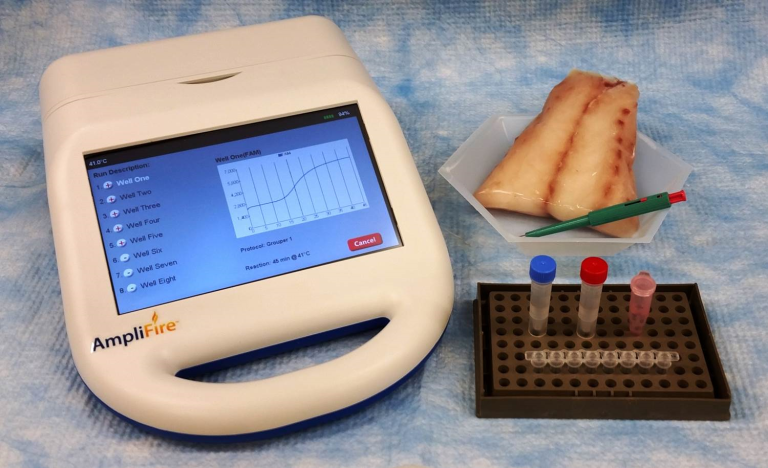It’s no secret that fraud is a problem in the seafood industry. Oceana repeatedly touts a mislabeling epidemic. While their method has been criticized, the perception of rampant fraud has been established.
The AmpliFire can run 8 isothermal reactions on DNA test strips and deliver test results in 15 minutes.The publicity affects folks on both sides of the supply chain — consumers fear a bait and switch, while responsible fishermen are forced to sell their catch at a deflated price.
Now, a St. Petersburg, Fla., company hopes to change this. Pure Molecular has developed a simple genetic test they say can tell the difference between fresh, gulf-caught grouper and common substitutes like king mackerel and Asian catfish.
The test, dubbed GrouperChek, is simple enough to be used by a layperson, cost-effective enough to be incorporated into commercial seafood operations and capable of delivering results in near real-time.
“DNA doesn’t lie,” said John Paul, CEO of Pure Molecular.
Paul and his COO, Bob Ulrich, are scientists at the University of South Florida, where they developed the technology behind GrouperChek. The duo is currently marketing the test to seafood restaurants in South Florida, but they plan to branch out into other markets and regions soon. They’re already working on similar tests for tuna and shrimp.
While GrouperChek has been publicized since early 2015, it's just now getting into the hands of businesses that can put it to good use on the local level. Crabby Bill’s, a popular Tampa-area seafood restaurant, is one of the company’s first customers.
“To give an unfair advantage to someone mislabeling an import as grouper when it’s not — that’s not in our DNA,” said restaurant owner Matt Loder, whose family has been a part of Florida’s seafood industry for 40 years. “We came up from a fisherman’s background. We want to be able to support local people … and not let them be taken advantage of.”
A similar test for shrimp is in the works, according to the company's website.







